Short Night of Glass Dolls Blu-ray Movie
HomeShort Night of Glass Dolls Blu-ray Movie 
Limited Edition to 3000Twilight Time | 1971 | 97 min | Not rated | Oct 16, 2018
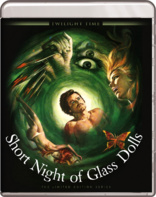
Movie rating
6.8 | / 10 |
Blu-ray rating
| Users | 0.0 | |
| Reviewer | 4.0 | |
| Overall | 4.0 |
Overview
Short Night of Glass Dolls (1971)
The corpse of reporter Gregory Moore (Jean Sorel of LIZARD IN A WOMAN'S SKIN) is found in a Prague plaza and brought to the local morgue. But Moore is actually alive, trapped inside his dead body and desperately recalling how the mysterious disappearance of his beautiful girlfriend (Barbara Bach of THE SPY WHO LOVED ME) led to a terrifying conspiracy of depravity. Can a reporter with no visible signs of life solve this perverse puzzle before he meets his ultimate deadline? Ingrid Thulin (THE DAMNED, SALON KITTY) co-stars in this unusual and startling giallo (also known as PARALYZED and MALASTRANA) that marked the debut of writer/director Aldo Lado (WHO SAW HER DIE?) and features a superb score by the legendary Ennio Morricone.
Starring: Ingrid Thulin, Jean Sorel, Mario Adorf, Barbara Bach, Fabijan ŠovagovićDirector: Aldo Lado
| Horror | 100% |
| Foreign | 92% |
| Mystery | 21% |
| Thriller | Insignificant |
Specifications
Video
Video codec: MPEG-4 AVC
Video resolution: 1080p
Aspect ratio: 2.34:1
Original aspect ratio: 2.39:1
Audio
Italian: DTS-HD Master Audio 2.0 (48kHz, 24-bit)
English: DTS-HD Master Audio 2.0 (48kHz, 24-bit)
Music: DTS-HD Master Audio 2.0 (48kHz, 24-bit)
Subtitles
English SDH
Discs
Blu-ray Disc
Single disc (1 BD)
Playback
Region free
Review
Rating summary
| Movie | 4.0 | |
| Video | 4.0 | |
| Audio | 4.0 | |
| Extras | 2.0 | |
| Overall | 4.0 |
Short Night of Glass Dolls Blu-ray Movie Review
Reviewed by Jeffrey Kauffman December 26, 2018One of the more potentially horrifying uses of a botanical in the history of medical science was the not all that long ago utilization of curare, the often deadly poisonous paralytic agent that is frequently mentioned in terms of “poison tipped arrows”. Kind of amazingly, at least to those who tend to delight in the “miracle” of modern medicine, curare was routinely used as a muscle relaxant in both surgeries and even electroshock therapy as recently as the mid-20th century. I came across the use of curare in my research on classic actress Frances Farmer, where it was clearly listed as being administered to patients about to undergo electroconvulsive therapy (ECT). When I first published my article about Farmer many decades ago, one of the more “energetic” responses I received was from a gentleman who found the whole idea of a paralytic poison being used in such circumstances patently ridiculous, something he felt “obviously” disproved other elements of my research. That said, not only has the use of curare been widely documented, at least in the internet age that grew after my article first saw the light of day, I also had the unique opportunity of being invited to meet with one of the “fathers of ECT” in the United States, who confirmed that curare was indeed regularly used for electric shock therapy patients in the early days of that “technology”. One of the frightening things about curare that ended up being disclosed in its use in actual surgeries, however, is that when it was used alone, it did absolutely nothing to abate pain, it simply made the patients unable to respond to it, since they were completely paralyzed. Luckily, better agents have been discovered and/or manufactured in the meantime, but for those wanting a cinematic treatment of what being hopelessly paralyzed while doctors poke and prod an apparently lifeless body might be like, Short Night of Glass Dolls might provide ample documentation.
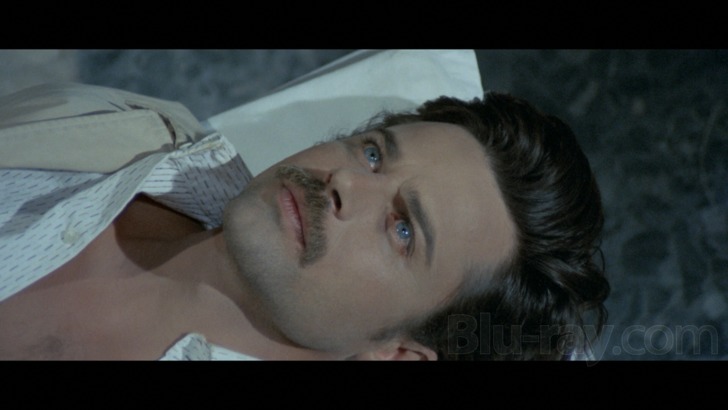
In a weird kind of way, Short Night of Glass Dolls plays a bit like an analog to the classic noir D.O.A., perhaps even more so than the film that is referenced in the commentary included on this track, Sunset Boulevard. Commentators David Del Valle and Matteo Molinari understandably draw a parallel between the “plights” of Joe Gillis in the Billy Wilder film and reporter Gregory Moore (Jean Sorel) in Short Night of Glass Dolls, since both are writers who are found (ostensibly) dead as each film opens, and who each offer some piquant narration along the way as a series of flashbacks unfold. But much as with D.O.A., Short Night of Glass Dolls actually details a whodunit aspect, while Sunset Boulevard of course doesn’t really have a similar underpinning, or at least such a major focus. What also unites D.O.A. and Short Night of Glass Dolls is that the hero in each film has been poisoned and is trying to figure out both why and by whom, though in the case of the film under review, he is incapacitated, under the sway of some kind of drug that has made him appear to be dead to everyone examining his supposed corpse.
In what might be thought of as the cinematic equivalent of a nesting doll, the “hook” of Gregory Moore’s predicament initially takes a back seat to another mystery as Moore’s memories start unspooling, namely the puzzling disappearance of Moore’s gorgeous girlfriend Mira Svoboda (Barbara Bach). Co-writer and director Aldo Lado offer an early seventies Prague that seems almost as decadent as the Berlin of Cabaret (Ingmar Bergman alum Ingrid Thulin shows up as a friend of Gregory's and for a moment I almost thought she was going to break into a song and dance routine, a la her erstwhile Bergman cohort Liv Ullmann in the recently reviewed The Serpent's Egg .) There's also a rather interesting political subtext running through the flashback sequences that gives the story a unique flavor. The pointed if subtextual skewering of Prague’s Communism may remind some of similar shaded criticism of religion, notably Catholicism, in such gialli as Don't Torture a Duckling.
As Del Valle and Molinari address in their commentary, even considering Short Night of Glass Dolls as a “true” giallo may engender certain stumbling blocks, and the film in fact eschews any number of what are considered to be “essential” tropes of the genre. Instead, there’s a really disturbing psychological element at play in the film, one that tips over into what is probably more of a traditional horror ambience in the closing moments. Interestingly, there was a long ago television outing that had a somewhat similar conceit to the main gimmick of this film, and it was a television outing with one very memorable (if brief) piece of casting. The very first season of Alfred Hitchcock Presents had a neat little episode named “Breakdown” with Joseph Cotten as the victim of a car accident who was still alive yet completely paralyzed and unable to communicate and therefore assumed to be dead. The episode is on one of the DVD collections of the series, and for those interested, pay attention to one of the road crew who finds Cotten: it’s none other than future producing giant Aaron Spelling, in one of his early acting performances.
Short Night of Glass Dolls Blu-ray Movie, Video Quality 
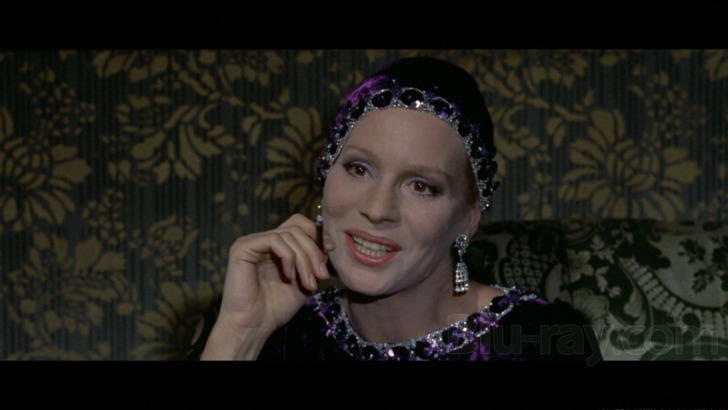
Short Night of Glass Dolls is presented on Blu-ray with an AVC encoded 1080p transfer in 2.34:1. The film has received a couple of other global releases, one from 88 Films for the United Kingdom market, and another German Blu-ray release from Camera Obscura that Svet reviewed several years ago. I don't have either of these releases to do a side by side comparison, but based solely on a screenshot comparison (always a bit risky, of course), it looks like this release can vary a bit in terms of brightness from the Camera Obscura release, but the palette looks similar if not downright identical. Detail levels are excellent throughout the presentation, with elements like the downy fine hairs on faces clearly visible even in less than optimal lighting, and elements like the textures on fabrics of costumes and upholstery looking nicely precise and problem free. As Svet mentioned in his review, there are some slight density fluctuations (I noticed some in a few establishing shots), but there is no really major damage of any kind. Grain resolves naturally throughout, and there are no issues with digital tweaking that I spotted.
Short Night of Glass Dolls Blu-ray Movie, Audio Quality 
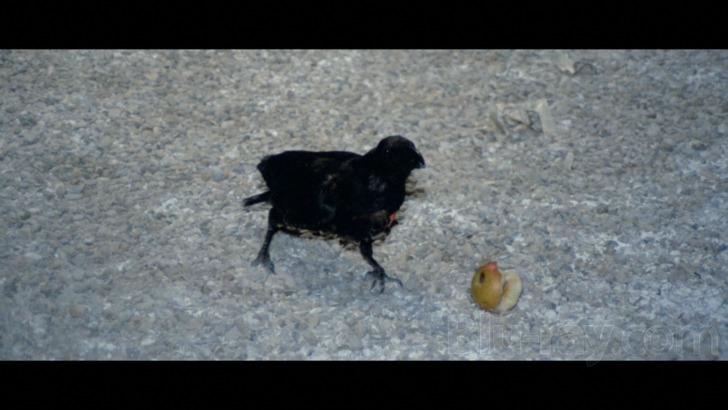
The Setup Menu on this disc slightly mislabels the two soundtracks (Italian and English) as being DTS-HD Master Audio 1.0, when they are actually DTS-HD Master Audio 2.0. There's no substantial difference in amplitude or overall mix between the two aside from the obvious variances due to voice acting. As is typically the case with many Italian films, sync is loose in both versions. Fidelity is fine, supporting narration, dialogue and the great Ennio Morricone score.
Short Night of Glass Dolls Blu-ray Movie, Special Features and Extras 
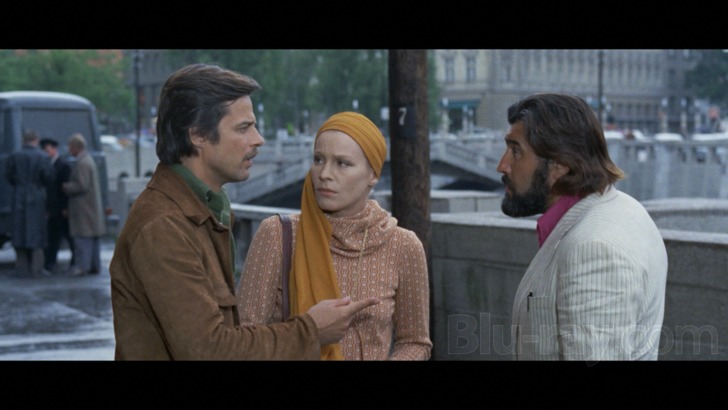
- Original English Theatrical Trailer (1080p; 3:05)
- Original Italian Theatrical Trailer (1080p; 3:05)
- Isolated Music Track presents Ennio Morricone's score in DTS-HD Master Audio 2.0.
- Audio Commentary by David Del Valle and Matteo Molinari
Short Night of Glass Dolls Blu-ray Movie, Overall Score and Recommendation 

This will be a rather harrowing picture for those who put themselves in Gregory's shoes (and/or paralyzed feet), though the film's vignette driven flashback style means that momentum can kind of stumble now and again. Gialli fans may not in fact want to even consider this as a "real" giallo, but it's still a rather riveting experience, and the finale, while arguably on the Grand Guignol side, is extremely memorable. While it's great that this release includes Ennio Morricone's score as an isolated track and also features a very enjoyable commentary track, the Camera Obscura release that Svet reviewed looks like it had substantially more plentiful bonus content, so those with region free players may want to consider that version. Recommended.
Similar titles
Similar titles you might also like

The Perfume of the Lady in Black
Il profumo della signora in nero
1974

What Have You Done to Solange?
Cosa avete fatto a Solange?
1972

The Bloodstained Shadow
Solamente nero
1978

Seven Blood Stained Orchids
Sette orchidee macchiate di rosso
1972

A Lizard in a Woman's Skin
Una lucertola con la pelle di donna
1971

All the Colors of the Dark
Tutti i colori del buio
1972

The Red Queen Kills Seven Times
La dama rossa uccide sette volte
1972

Who Saw Her Die?
Chi l'ha vista morire?
1972

Deep Red
Profondo rosso | Special Edition
1975

The Bloodstained Butterfly
Una farfalla con le ali insanguinate
1971

The Bird with the Crystal Plumage 4K
L’uccello dalle piume di cristallo
1970

Death Walks on High Heels
Special Edition | La morte cammina con i tacchi alti
1971

Death Walks at Midnight
Special Edition | La morte accarezza a mezzanotte
1972

The Crimes of the Black Cat
Sette scialli di seta gialla | Standard Edition
1972

The Cat o' Nine Tails
Il gatto a nove code | Remastered
1971

Don't Torture a Duckling
Non si sevizia un paperino
1972

Death Carries a Cane
Passi di danza su una lama di rasoio
1973

Blood and Black Lace
Sei donne per l'assassino
1964

Luz
2018

Enigma Rosso
Virgin Killer / Red Rings of Fear / Orgie des Todes
1978